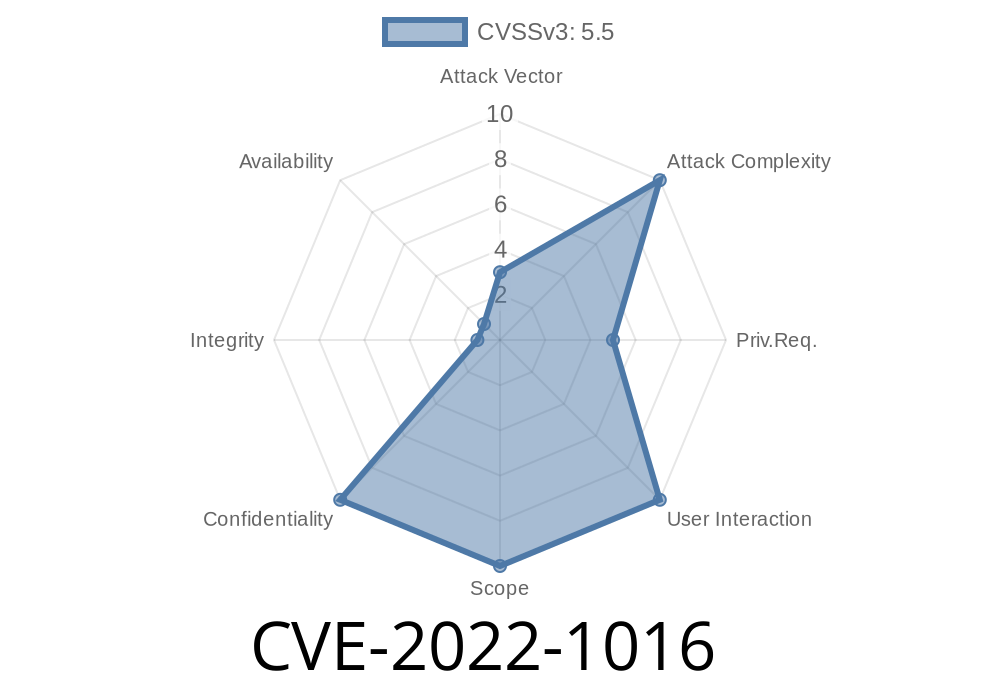In early 2022, security researchers discovered a serious vulnerability in the Linux kernel, identified as CVE-2022-1016. This flaw lies in the net/netfilter/nf_tables_core.c:nft_do_chain function and is related to handling 'return' without proper preconditions, which opens the door for a use-after-free bug. If exploited, this vulnerability can lead to a kernel information leak—giving local, unprivileged attackers access to sensitive data.
This post breaks down what CVE-2022-1016 is, how it can be exploited, and what you can do to protect your systems. We’ll include simple code snippets and point you to further references so you can understand the risk and mitigation steps.
What is CVE-2022-1016?
The netfilter subsystem of the Linux kernel is essential for implementing packet filtering, network address translation (NAT), and other packet-manipulation features. Specifically, *nf_tables* is the newer framework replacing iptables and other legacy systems.
CVE-2022-1016 is about how nf_tables processes chains (rules about what to do with network packets). Due to a missing check around return operations, an object in memory can be freed, but kernel code continues to use it as if it's safe. This “use-after-free” bug can eventually leak kernel memory contents to unprivileged, local users.
Linux kernel versions before 5.16.11 (see references for patched versions)
- Systems/persons using nf_tables with unprivileged local users or processes
Deep Dive: How the Vulnerability Works
Let’s get a bit technical. The main problem is in the function nft_do_chain() in nf_tables_core.c. Here’s a simplified pseudo-code snippet to illustrate what goes wrong:
int nft_do_chain(...) {
...
if (rule->flags & NFT_RULE_RETURN) {
// Should check if it's safe to return here!
return verdict;
}
// ... Possibly freeing rule ...
do {
use_rule(rule);
} while (...);
...
}
In the absence of a proper check, the function may return early, skipping cleanup or reference management tasks that should happen before the function finishes. This can leave a dangling pointer (reference to deallocated memory), so when the object is re-used, it might contain sensitive data or attacker-controlled content.
A real-world snippet from the kernel diff fixing this issue (see kernel.org patch):
if (rule->flags & NFT_RULE_RETURN) {
- return verdict;
+ rv = verdict;
+ goto out;
}
...
+out:
+ /* Proper cleanup and memory safety handled here */
+ return rv;
This fix ensures that whenever the function wants to return, it first runs the required preconditions (like safely freeing or handling objects) before returning.
How Attackers Exploit CVE-2022-1016
A local, unprivileged attacker can craft a special set of nf_tables rules and actions to trigger the faulty function path. If timed right, the attacker can read leftover memory or corrupt things further.
Steps of a Typical Exploit
1. The attacker creates a chain with carefully crafted rules to force an early return inside nft_do_chain().
2. After the rule was freed, the attacker triggers code that reuses the memory, causing the kernel to leak data—possibly exposing kernel pointers or sensitive information in the freed memory region.
3. Using this information, the attacker can bypass further security mechanisms or even escalate privileges (in combination with other kernels flaws, e.g. heap spraying).
A simplified PoC (do not run in production!)
# As a local user (with user namespace)
unshare -Ur # Enter a new user namespace
nft add table inet test
nft add chain inet test mychain { type filter hook input priority \; }
# The following rule could be crafted to trigger the bug
nft add rule inet test mychain return
This might, under vulnerable versions and with specific timing, cause kernel memory to be leaked in error messages or other contexts.
Mitigation
The bug was fixed in Linux 5.16.11, 5.15.25, and 5.10.104. If you use nf_tables, make sure you're running at least one of these versions or later.
Upgrade your kernel now.
- Kernel.org 5.16.11 release notes
- Distro updates (check your Linux distribution’s security advisories)
References
- CVE-2022-1016 on MITRE
- Linux kernel patch commit
- Red Hat Security Advisory
- Arch Linux Security Tracker
Conclusion
CVE-2022-1016 is a classic example of how a small oversight with return conditions in a key kernel subsystem can turn into a critical information leak. If you run Linux—especially in shared environments—it is essential to patch this bug as soon as possible.
For security engineers and enthusiasts, keeping up to date with kernel patches and understanding the root cause of such flaws is key to defending your systems. Using best practices on privilege separation, kernel hardening, and timely updates will help keep threats at bay.
If you want to read more about recent Linux kernel security flaws, follow Linux Kernel Archive and your distribution’s security channels.
Timeline
Published on: 08/29/2022 15:15:00 UTC
Last modified on: 09/08/2022 13:15:00 UTC
